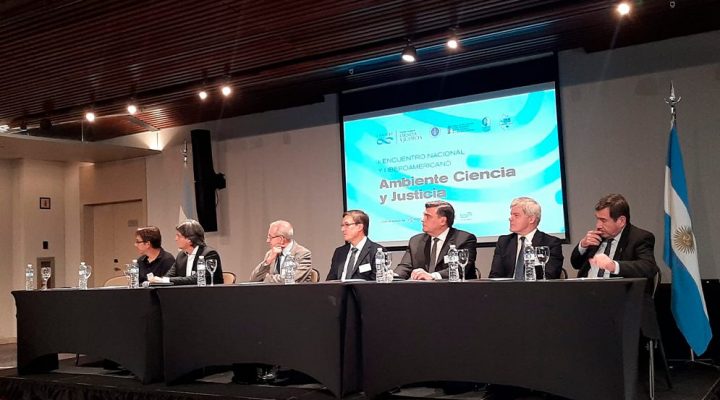NATIONAL PROGRAM FOR SCIENCE AND JUSTICE
Second National and first Ibero-American Meeting of Environment, Science and Justice
The National Scientific and Technical Research Council (CONICET), through the National Program for Science and Justice, held the II National and I Ibero-American Meeting on Environment, Science and Justice in the city of Santa Rosa – La Pampa.
It was co-organized with the Federal Board of Cortes and Superior Courts of Justice of the Argentine Provinces and Autonomous City of Buenos Aires (Ju.Fe.Jus.), the Network of Judicial Training Schools (Reflejar), the Council of Attorneys, Prosecutors, Defenders and General Advisors of the Argentine Republic and the Association of Prosecutors and Officials of the Public Ministry of the Nation, together with the support and sponsorship of the Innova-T Foundation. It should be noted that the host institution of the event was the Attorney General’s Office of La Pampa, headed by Dr. Mario Bongianino.
The aim of this meeting was to develop a “Guide to good practices in environmental expertise” that reflects the best uses, experiences and customs of the institutions through working groups with representatives of each of them in the different lines of environmental expert work agreed upon during the I Meeting “Environment, Science and Justice” held in November 2022.
In this regard, the Legal Affairs Manager of CONICET and Technical Representative of the National Program for Science and Justice, Alan Temiño, said: “The Environment, Science and Justice meetings continue to be developed to improve the relationship between these fields and facilitate the exchange of experiences and knowledge on topics such as environmental expertise and scientific communication to strengthen the justice service. In addition, they contribute to federalism by taking place, as on this occasion, in the interior of the country and getting involved from science in local experiences and causes.”
For his part, the Attorney General of the Public Ministry of La Pampa, Dr. Mario Oscar Bongianino highlighted the relevance of this type of meetings: “The importance is to connect two worlds that seemed distant, not very reconcilable and that use different languages. From the National Program for Science and Justice, a product of the relations between the Council of Attorneys and CONICET, we have begun to understand each other better.”
Analysis, Forensics, Protocol and Environmental Jurisprudence.
During the two days, workshops and plenary panels were held in which researchers from CONICET spoke along with representatives of the justice system. It was aimed at prosecutors, judges, defenders and judicial operators, as well as the entire scientific and academic community, students and people interested in the subject. As a result of the meeting, the PhD from the University of Buenos Aires with a place of work in the Scientific Research Agency (Public Ministry – Government of the province of La Pampa) and Member of the Advisory Council of the National Science and Justice Program, Luciano Merini, highlighted the federal imprint. “It was not an event only held in La Pampa but with truly federal participation. More than 15 provinces were represented by JuFeJus, Reflejar, AFFUN and the Council of Attorneys,” he noted.
It is worth highlighting the presentation made by CONICET researchers and members of the Program, Adonis Giorgi and Carolina Vilches, highlighting the use and application of bioindicators in possibly contaminated water courses.
For her part, Claudia Garcia Bonelli who is a biochemistry (UBA) with a workplace at the Institute of Pharmacology (Faculty of Medicine – UBA) and also a member of the Program Advisory Council, reflected on the meetings, pointing out that “they drive a series of protocols that we can write between the actors of Justice and CONICET and we can define harmonized protocols that can accelerate and better administer Argentine justice.”
The II National and I Ibero-American Meeting reached international relevance, since it had the participation of Dr. Luis Burillo (National Institute of Toxicology and Forensic Sciences of Spain) and Dr. Antonio Vercher Noguera (District Prosecutor for Environment and Urban Planning of Spain ) who reflected that “Argentina is a country with extraordinary natural wealth, something that unfortunately I cannot say about my country, since it is a smaller country where historical events have determined a powerful exploitation of its natural resources for many years” and He added “I think that the opportunity that Argentina has is fantastic. The decisions made in this regard, especially when developing this type of events, have been very intelligent.”
At the end of the meeting, Temiño highlighted: “Different workshops were developed with the thematic axes that the Program has been working on together with the other co-organizing entities. Our purpose is that conclusions are drawn from them, seeking to generate documents and thus continue developing proposals so that both the Public Ministries and the Courts can improve their services and – above all – the capacities that the courts have to resolve the conflicts of the citizens who present before Justice.”
After the meeting, Merini commented on how the work will continue within the axis of environment, science and justice, in this regard he stated: “Now, based on this work, we are going to prepare a final document. Part of it was presented at the close of the meeting, but – just as we did at the close of the first meeting – we are going to prepare a document that will be ratified and signed by all the institutions. This will become the work agenda for our next cycle. That is, to continue with the development of this guide to good practices.”
For more information about the Environment, Science and Justice axis, click here.
